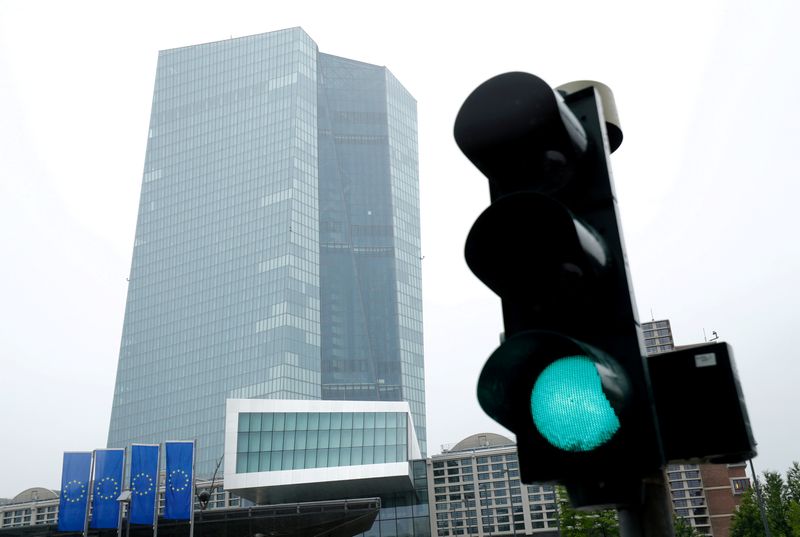By Balazs Koranyi and Francesco Canepa
FRANKFURT (Reuters) - The European Central Bank finally acknowledged mounting inflation risks and even opened the door a crack to an interest rate increase this year, marking a remarkable policy turnaround for one of the world's most dovish central banks.
The ECB has long argued that high inflation will fall back below its 2% target on its own later this year but a string of record-high readings have challenged a narrative that other central banks abandoned months ago.
"Inflation is likely to remain elevated for longer than previously expected but to decline in the course of this year," ECB President Christine Lagarde told a news conference.
"Compared with our expectations in December, risks to the inflation outlook are tilted to the upside, particularly in the near term," she said, arguing that price growth across the 19 countries that use the euro is becoming more broad-based.
"The situation has indeed changed."
While Lagarde said the ECB would not rush into any move, she declined to repeat her previous guidance that an interest rate increase this year was "very unlikely".
Sources close to the discussion said that a sizable minority of policymakers had pushed for the bank to take action on Thursday, possibly by announcing a faster reduction of bond purchases, before agreeing to hold off until March.
The sources said policymakers were clear that a rate increase this year should no longer be excluded given the inflation risks and uncertainty in forecasts.
Investor reaction was fierce and market moves were unusually large. Around 40-45 basis points of rate hikes were priced in by December after the news conference, compared to 28 basis points beforehand. Such a move would put the ECB's deposit rate not far below zero percent after years in negative territory.
The euro firmed three-quarters of a percent against the dollar while yields on German 10-year bonds rose 10 basis points.
"The European Central Bank made a remarkable hawkish backward roll," ING economist Carsten Brzeski said. "Today's ECB meeting marks an important hawkish shift.
MARCH
Lagarde, however, insisted that the sequence of the ECB's future policy moves will not change, so asset buys, now set to run indefinitely, will have to end before borrowing costs can be increased.
"We will continue to observe the sequence we have agreed and we will be gradual in any determination we make," she said.
She said March's meeting will be crucial as new economic projections could provide the justification for any policy move.
A first step is likely to be acceleration in winding down bond purchases, now set to be reduced in several steps to 20 billion euros a month by the fourth quarter.
While global peers such as the U.S. Federal Reserve https://www.reuters.com/business/fed-officials-say-march-rate-hike-track-future-increases-data-dependent-2022-01-31 and the Bank of England https://www.reuters.com/business/bank-england-hikes-rates-clamour-contain-inflation-2022-02-03 tighten policy, the ECB has been a notable outlier. It is still providing copious monetary stimulus after undershooting its inflation target for most of the past decade.
Euro zone inflation hit a record high 5.1% in January, well above the ECB's own projections. Lagarde admitted that the figure, driven by higher energy and food prices, had caught even the central bank off-guard.
Analysts, always more cautious than market investors, said that a rate hike this year is far from a done deal but the chances are rising.

"There is a chance now that the criteria for lift-off will be met as soon as in March, or by June at the latest," Pictet Wealth Management strategist Frederic Ducrozet said.
"Discussion will then focus on a possible faster tapering of the asset purchase programme."